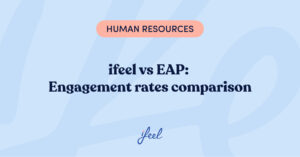When we realise that we need psychological support, one of the first solutions we think of is our medical insurance coverage, questioning whether it includes mental health coverage.
However, despite the known importance of mental health being on par with physical health, there are still insurance companies that may reject claims if they do not consider the treatment to be “medically necessary.”
In the corporate environment, mental health is an essential part of employees’ overall well-being and has thus become a growing priority for businesses. They ensure medical insurance for their employees and proper mental health coverage.

The importance of mental health coverage in medical insurance
Mental health coverage in medical insurance is a critical component of employee well-being and a determining factor for productivity and job satisfaction.
Mental disorders, such as anxiety and depression, are common and can significantly impact a person’s work life. However, the greatest barrier to obtaining help can be the cost, which can hinder early intervention, worsening the patient’s symptoms.
In fact, research shows that nearly 42% of adults with mental illnesses reported being unable to receive necessary treatment, primarily due to the inability to afford it.
Therefore, a crucial part of a business strategy should be providing psychological support to its employees. This preventive measure not only improves staff well-being but can also lead to significant savings in costs related to mental health-related absences in the long term.
“Before choosing ifeel, we were offering health insurance in most of our locations but we knew that a healthy mind is just as important to the wellbeing of employees. We also know that investing in wellbeing helps reach employees their full potential and benefits both people and organization.”
Benefits of including mental health coverage
Including mental health coverage in corporate medical insurance offers numerous benefits for both employees and businesses:
- Compliance with regulations and social responsibility: Companies with mental health coverage in their medical insurance can comply with occupational health and safety regulations. This compliance not only avoids potential penalties but also reinforces the company’s reputation as a responsible entity committed to the well-being of its employees.
- Reduction in absenteeism: Employees who have access to psychological services tend to take fewer sick days due to mental health issues.
- Increased productivity: Adequate mental health improves employees’ concentration, creativity, and efficiency.
- Improved workplace environment: A work environment that supports mental health promotes a more positive organisational culture.
- Improved employee retention: Offering attractive mental health benefits can be a decisive factor for employee retention. In a competitive labour market, employees increasingly value benefits supporting their well-being.
Therefore, companies that provide mental health coverage can stand out as employers of choice, reducing turnover and the costs associated with recruiting and training new staff.
Javier Sordo Gómez, Head of People at Thoughtworks, an ifeel partner company, adds:
“In addition to encouraging safe environments, free of tension and unnecessary stress, companies can provide their employees with other tools. From solutions focused on mental well-being such as ifeel to offering healthy options to your employees, from the food you offer in your offices to discounts or subscriptions that encourage physical activity or self-care. .”

How medical insurance and mental health coverage work
Medical insurance can offer different types of mental health coverage, including:
- Individual and Group Therapy: Consultations with licensed psychologists and therapists.
- Psychiatric Treatment: Services from psychiatrists, including evaluations and medication management.
- Wellness Programs: Initiatives promoting mental health, such as stress management and mindfulness workshops.
Each insurance plan has its own policies and limits regarding mental health coverage. Therefore, companies must understand these variations to select the most appropriate plan for their employees. Key aspects to consider include:
- Number of Covered Sessions: Some plans may limit the number of annual therapeutic sessions.
- Referral Requirements: In some cases, a medical referral may be necessary to access psychological services.
- Medication Coverage: The inclusion of psychiatric medications and their coverage varies among different insurance plans.
Steps to implement mental health coverage in medical insurance plans
1. Evaluation of company needs
Before implementing or expanding mental health coverage, it is crucial to assess the company’s and employees’ needs thoroughly. This can include wellness surveys, analysis of occupational health data, and consultations with mental health experts.
2. Selection of the appropriate insurance provider
Choosing the right insurance provider is a strategic decision that can impact employees’ mental health. Factors to consider include:
- Experience and reputation of the provider: Evaluate the provider’s track record in offering mental health services.
- Flexibility and customisation: Opt for plans that allow customisation according to the specific needs.
- Support and additional resources: Consider providers that offer educational resources and additional support for mental health promotion.
Technology in insurance plays a key role in personalising and making these services more efficient, allowing better monitoring and attention to employees’ mental health needs.
3. Creation of a Supportive Environment
Creating a psychologically safe work environment that supports mental health is essential to encourage the use of psychological services. This includes DEIB strategies, non-discrimination policies, mental health awareness programs, and training leaders to identify and support employees with psychological needs.
4. Effective Communication of Benefits
Employees must be well-informed about the available mental health benefits and the positive impact these can have on their lives.
Companies can use multiple communication channels, such as internal newsletters, informational workshops, and Q&A sessions, to ensure all employees understand and utilise the mental health services included in their medical insurance plan.
Mental health and health insurance should be recurring topics in these communications to highlight their importance.

Redefining mental health for insurance
At ifeel, we know that integrating mental health coverage into medical insurance benefits employees by improving their well-being and mental health and offers significant advantages for businesses. In this regard, implementing mental health solutions for insurers can be a key factor in the success and well-being of their employees.
It is, therefore, timely for insurers to rely on experts to ensure that their product remains at the cutting edge. To assist in this process, ifeel has developed a mental well-being solution for insurers to help insurers increase accessibility and reduce mental health claim costs.
Thanks to this service, insurers can receive personalised, data-driven advice on the most effective measures to detect mental health problems in their policyholders, accurately understand users’ needs and respond appropriately to their claims thanks to our innovative triage system.
This approach helps insurers provide continuous and adaptive support, improving customer satisfaction and loyalty. In addition, this solution helps reduce the frequency and severity of mental health-related claims, optimising risk management.
Clients such as SCOR, AXA, and Femi Connecting Healthcare already rely on our services, which improve the quality of life of their policyholders and increase the operational efficiency of their organisations.
We hope you found this article on mental health coverage interesting. If you would like to learn more about our mental well-being solution for insurers, simply request it, and we will contact your team as soon as possible.






